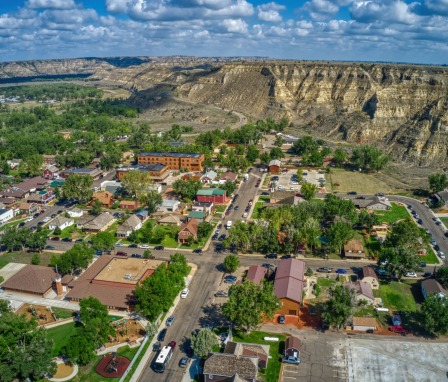 Credit: Jacob Boomsma / iStock / Getty Images Plus
Credit: Jacob Boomsma / iStock / Getty Images Plus
In March of 2023,North Dakota made headlines for being the first state in the country to require cybersecurity education as a part of its grade school curriculum. With multiple educational programs, job opportunities, and a growing tech industry, earning a cybersecurity degree in North Dakota can accommodate learners seeking more-affordable-than-average tuition and a more rural lifestyle. State-funded services like Find The Good Life in North Dakota help newcomers relocate and find careers.
North Dakota at a Glance
- Average Wage for Computer and Mathematical Occupations, 2021: $76,900
- Percentage of Workforce in Tech: 3%
- Economic Impact of Tech Industry: $2 billion
- Number of Higher Learning Institutions: 20
Sources: Cyberstates™, NCES, OEWS
Why Go to College for Cybersecurity in North Dakota?
Even though North Dakota is one of the lesser-populated states — ranking 47th overall for population — the state's economy is flourishing in part thanks to theBakken oil boom, which began around 2008. North Dakota now has one of the lowest unemployment rates in the country.
In addition to a robust job market, the state is home to several colleges and universities that offer cybersecurity programs. For example, the University of North Dakota offers a cybersecurity bachelor's program, while North Dakota State University offers a graduate-level cybersecurity certificate. Median tech wages in North Dakota are also 56% higher than national median wage, according to CompTIA's 2023 Cyberstates report. Because the state maintains a lower-than-average cost of living, these higher-than-average salaries carry stronger purchasing power than they do in more expensive states.
Education Statistics for North Dakota
| Higher Education Statistics | North Dakota Data | National Data |
|---|---|---|
| Four-Year Colleges | 15 | 2,520 |
| Two-Year Colleges | 5 | 1,216 |
| Students Enrolled in Distance Education | 55.9% | 59% |
Sources: NCES
North Dakota's higher learning institutions vary in size from large to small. Learners can pursue their degree in city and rural settings. Schools in this state offer classes in person or online.
Accreditation for North Dakota Schools
Institutional accreditation is crucial for colleges and universities to certify their adherence to academic quality standards. Accrediting agencies maintain these standards and periodically review institutions to ensure they continue fulfilling these criteria. Many schools in North Dakota hold institutional accreditation from the Higher Learning Commission.
Specific programs within institutions can also pursue optional programmatic accreditation, which verifies how well a program's curriculum prepares graduates for careers in their field. Cybersecurity programs in North Dakota may hold accreditation from agencies like ABET.
Popular Online Programs
Learn about start dates, transferring credits, availability of financial aid, and more by contacting the universities below.
Considerations for Cybersecurity Programs in North Dakota
Selecting the right cybersecurity program requires prospective students to consider several factors. First, figure out which degree level you need. Many cybersecurity jobs require at least a bachelor's degree, while some entry-level positions accept an associate degree. You can explore the field without immediately committing to a full program by pursuing a free massively online open course in cybersecurity. Another factor to consider is whether you prefer in-person or online learning. Though online programs — especially asynchronous ones — use more flexible schedules, they also require self-sufficiency and may not offer as much interaction with faculty and peers. Some degrees offer hybrid learning models, which combine online and in-person requirements and can provide benefits from both styles of learning.
You should also investigate important statistics from each school like student-to-faculty ratios as well as graduation and job placement rates. Graduation rates can indicate how well a school supports its students, while job placement rates can reveal how marketable the degree is for graduates beginning their careers. Institutions with lower student-to-faculty ratios often have more opportunities for personalized instruction.
The table below explores the proportion of students taking online classes in North Dakota in 2021. Note that these enrollment trends may reflect the COVID-19 pandemic.
Explore rankings for top cybersecurity programs around the country:




Cybersecurity Concentrations and Similar Degrees
There are multiple options for cybersecurity education in North Dakota. Below, we explore three programs at different levels to survey the diversity of academic credentials in the state.
Cybersecurity graduate certificate
Minot State University offers a graduate-level certificate in cybersecurity management. This three-course credential runs fully online and helps train enrollees for advanced roles in cybersecurity. Students can transfer these credits to the school's master's in information systems program.
Online cybersecurity master's degree
The online master's degree in cybersecurity from the University of North Dakota requires 36 credits. Students can complete the program in two years of full-time study. Curriculum tracks include ethical hacking, computer forensics, and secure networks.
Cybersecurity and computer networks associate degree
The two-year associate degree in cybersecurity and computer networks from Bismarck College runs on campus and online. The program can help learners qualify for entry-level jobs in tech and IT. Courses explore topics like networking, Windows infrastructures, and Linux.
Paying for Your Cybersecurity Degree in North Dakota
Pursuing a college degree can be expensive. Across almost every degree type, North Dakota offers lower-than-average tuition, including out-of-state tuition that comes in below some states' in-state prices.
Research financial aid options to help pay for your degree, including scholarships, fellowships, grants, and student loans.
In-State Versus Out-of-State Tuition
Since public universities receive funding from residents' taxes, they typically charge learners from within the state a lower tuition rate compared to students from other states. In North Dakota, the average tuition for out-of-state learners at public institutions is roughly $4,500 higher than for in-state learners. Note that some online programs may charge distance education enrollees in-state or otherwise lower tuition, which can help learners save money.
North Dakota is also a member of two reciprocity programs: the Midwestern Higher Education Compact and the Western Interstate Commission for Higher Education. Participating institutions offer lower tuition to students from other states with membership in these pacts.
North Dakota's Cost of Living
In addition to tuition, learners should budget for expenses like rent and groceries. According to World Population Review, which scores each state against a national index of 100, North Dakota has a lower-than-average cost of living with a 94.6 score.
Popular Online Programs
Learn about start dates, transferring credits, availability of financial aid, and more by contacting the universities below.
North Dakota Jobs for Cybersecurity Graduates
Our growing dependence on technology means an increased demand for professionals with tech skills, including cybersecurity knowledge. Consequently, jobs in this field are in demand across the globe, including in North Dakota. Because almost every industry uses technology and has secure information that needs protection, professionals can find cybersecurity job opportunities across sectors.
Select Cybersecurity Careers in North Dakota
Information Security Analysts
Information security analysts protect organizations' computer networks and systems from security breaches and cyberthreats. They monitor for suspicious activities, implement security measures, and respond to incidents to ensure data remains secure.
- 2022 Average Wage in North Dakota: $90,130
- Job Outlook in North Dakota (2020-30): Projections Central projects 23.1% job growth between 2020 and 2030 for this career in North Dakota.
Penetration Tester
A penetration tester, also called an ethical hacker, is a cybersecurity professional responsible for assessing the security of computer systems, networks, and applications. These workers simulate cyberattacks to identify vulnerabilities and weaknesses that malicious hackers can exploit. Typically, a penetration tester needs a background in computer science, information security, or a related field, and may need certifications such as certified ethical hacker or offensive security certified professional.
- 2022 Average Wage in North Dakota: $90,130
- Job Outlook in North Dakota (2020-30): Projections Central includes penetration testers in the broad career category of information security analysts. The organization projects 23.1% job growth between 2020 and 2030 for this career in North Dakota.
Security Engineer
Security engineers design and implement secure IT infrastructures, manage security solutions, and respond to incidents. They need a background in computer science or information security, along with practical experience in security technologies. Credentials like certified information systems security professional or certified information security manager can help boost career prospects.
- 2022 Average Wage in North Dakota: $90,130
- Job Outlook in North Dakota (2020-30): Projections Central includes security engineers in the broad career category of information security analysts. The organization projects 23.1% job growth between 2020 and 2030 for this career in North Dakota.
North Dakota Employment Trends
| Year | State | National |
|---|---|---|
| Information Security Analysts | ||
| 2018 Employment | 130 | 66,200 |
| 2028 Projected Employment | 160 | 67,300 |
| Projected Job Growth, 2018-28 | +23.1% | +1.7% |
| Computer Network Architects | ||
| 2018 Employment | 140 | 165,200 |
| 2028 Projected Employment | 170 | 174,200 |
| Projected Job Growth, 2018-2028 | +21.4% | +5.4% |
| Software Developers and Software Quality Assurance Analysts and Testers | ||
| 2020 Employment | 1,640 | 1,847,900 |
| 2030 Projected Employment | 2,100 | 2,257,400 |
| Projected Job Growth, 2020-2030 | +28% | +22% |
Source: Projections Central
| Career | North Dakota Employment | North Dakota Annual Mean Wage | National Median Annual Wage |
|---|---|---|---|
| Computer and Information Systems Managers | 540 | $138,830 | $173,670 |
| Computer Hardware Engineers | 150 | $112,930 | $140,830 |
| Computer Network Architects | 170 | $103,230 | $129,490 |
| Computer Network Support Specialists | 800 | $68,180 | $76,060 |
| Computer Programmers | 310 | $89,220 | $102,790 |
| Computer Systems Analysts | 200 | $95,540 | $107,530 |
| Information Security Analysts | 250 | $90,130 | $119,860 |
| Network and Computer Systems Administrators | 630 | $83,360 | $97,160 |
| Software Developers | 2,070 | $85,220 | $132,930 |
| Web Developers | 80 | $75,980 | $87,580 |
Source: BLS OEWS
While average tech wages in North Dakota are lower than average, this corresponds to the state's lower-than-average cost of living, which means that cybersecurity workers' salaries may have higher purchasing power than their counterparts with higher wages in more expensive states. Additionally, even careers like software developer — with an average salary almost $50,000 below the national average — earn higher average wages than the state's average wage for all workers, which was $55,800 as of 2022.
Cybersecurity Employers in North Dakota
U.S. Cybersecurity & Infrastructure Security Agency: The U.S. Cybersecurity & Infrastructure Security Agency has a branch in Bismarck that hires security professionals. This division handles issues like chemical and infrastructure sector security.
Leidos: Leidos is an American defense, aviation, information technology, and biomedical research company with operations in North Dakota cities like Bismarck and Grand Forks. The organization provides services to government agencies, national security organizations, and businesses.
University of North Dakota and North Dakota State University: Institutions like North Dakota State University and the University of North Dakota both hire IT professionals to help run digital operations and protect sensitive data like student information.
Cybersecurity Organizations in North Dakota
The North Dakota Information Technology Department offers educational resources and training opportunities for students and professionals to enhance cybersecurity knowledge and skills.
Cybercon at Bismarck State College is an annual conference in Bismarck that brings together industry experts, professionals, and enthusiasts to discuss cybersecurity trends, challenges, and solutions.
The Cyber Awareness and Research Symposium at the University of North Dakota provides networking opportunities for industry professionals, academics, and the community. The symposium is divided into two tracks: The awareness track focuses on educating attendees about topics like cyber hygiene and asset protection. The research track focuses on research about new cybersecurity methods.
Schools With Cybersecurity Degrees in North Dakota
- North Dakota State University: NDSU offers an MS in cybersecurity. This degree builds advanced knowledge in cybersecurity, digital forensics, and secure software development.
- University of Mary: The University of Mary's BS in cybersecurity administration is designed to equip enrollees with skills in cybersecurity tools, digital forensics, and ethical hacking. The curriculum combines theory with hands-on training to prepare students for cybersecurity challenges in various industries.
- University of North Dakota: UND's BS in cybersecurity focuses on preparing students with practical skills and real-world cybersecurity experience. The program emphasizes hands-on opportunities, including a two-semester course sequence that requires learners to design and test a project.
Popular Online Programs
Learn about start dates, transferring credits, availability of financial aid, and more by contacting the universities below.
Questions About Cybersecurity in North Dakota
Can I get a cybersecurity degree in North Dakota?
Yes, numerous public and private institutions in North Dakota offer cybersecurity programs at multiple degree levels. Some programs specifically focus on cybersecurity, while others have a broader information security focus.
Are the best cybersecurity schools in North Dakota expensive?
Average tuition in North Dakota is lower than the national averages at four-year schools and for out-of-state learners at two-year schools. Even with this lower-than-average tuition, prospective students should research financial aid options to help reduce the cost of their degree.
Are cybersecurity programs in North Dakota competitive?
Generally, as the demand for cybersecurity professionals increases, programs may become more competitive due to a growing number of applicants seeking to enter the field.
Is cybersecurity a good career in North Dakota?
Cybersecurity careers are in demand in North Dakota. Many tech roles in the state pay average wages that exceed the state's average wage for all workers. Because digital security is necessary across many industries, cybersecurity professionals can find work with many businesses and government agencies.
Last reviewed August 14, 2023.
Recommended Reading
Take the next step toward your future.
Discover programs you’re interested in and take charge of your education.

 Reviewed by
Reviewed by